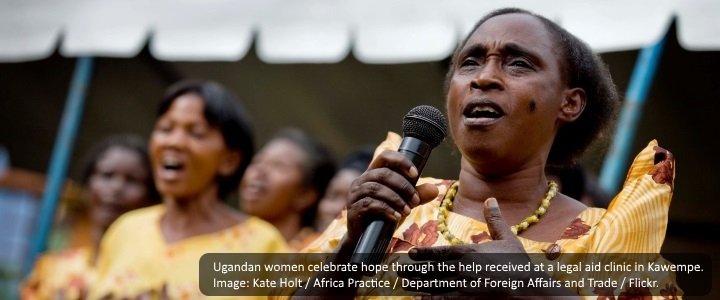ACFID is continuing its Spotlight on the Code of Conduct series, this time shining a light on Quality Principle 2 of ACFID’s Code of Conduct – Participation, Empowerment & Local Ownership.
Quality Principle 2 is focused on participation, empowerment, and local ownership – and recognises the importance of communities and individuals being fully empowered actors in their own development process. Having the voice of primary stakeholders at the forefront of aid and development work ensures that the activities we undertake will effectively meet their needs.
The Code has evolved to emphasise the importance of addressing the principles of empowerment and local ownership explicitly. Quality Principle 2 is implemented through five Commitments by ACFID Members, that when taken together accommodate the diversity of approaches taken by ACFID Members.
2.1 – We promote the participation of primary stakeholders
This commitment spells out the need for members to ensure authentic and meaningful involvement of primary stakeholders in the design and planning processes, as well as the need for organisations to monitor and evaluate this participation so that this intent is supported by evidence.
Coming up, we profile a story of how The Fred Hollows Foundation led a project in the Philippines that aimed to understand how human-centred design methodologies with communities can be used for more inclusive development practices. This presentation by Farzad Yazdanparast shares the human-centred design methodologies used, the results gathered, and the learning that can be applied by other agencies to engage communities for inclusive development.
2.2 – We promote the empowerment of primary stakeholders
When we promote opportunities for primary stakeholders to participate in decision-making about initiatives that affect them, empowerment follows. Formal mechanisms for primary stakeholders to contribute their ideas, feedback and complaints include participatory workshops, community meetings, survey tools and many others.
In this inspiring video we interview Sara Webster, previous Program & Policy Manager at Hagar Australia, who discusses how they promote and achieve participation at all stages of their activities. Sara describes strategies they use to empower their clients and relays a moving story of how one of their primary stakeholders was the embodiment of empowerment at an international level. This video is a great demonstration of how one of our members has effectively implemented Quality Principle 2 in practice.
2.3 – We promote gender equality and equity
This Commitment calls for both participation and empowerment approaches, with gender equity and equality placing a strong focus on women and girls. At the same time it acknowledges and, where appropriate, asks members to address discrimination and exclusion due to gender identity.
In this Spotlight we profile ACFID’s newly released Gender Audit Toolkit – demonstrating that the Code’s commitment to promoting gender equality and equity is not only for international development activities – but also within our own organisations. The free online Gender Audit Toolkit is now available here.
Additionally, the ACFID Gender Equality Community of Practice will host a webinar highlighting faith-based approaches to tackling gender-based violence in the Pacific, on 16 July – register here.
A huge amount of resources are available in the ACFID Good Practice Toolkit – ranging from member policies to practice notes and toolkits. Make sure you visit our resources section here.
2. 4 – We promote the empowerment of people with disabilities
The Code asks members to not only have an organisational commitment to the inclusion of people with disabilities, but also to ensure they are consulted and included in the planning process. Barriers to their participation need to be identified and mitigated, and opportunities created to allow them to be included in the decision-making processes. Progress in promoting their empowerment is to be monitored and evaluated along the way.
Watch out for a blog by CBM Australia – they use a mainstream health program in Indonesia to highlight their strategies to enable meaningful participation by people with a disability, at every stage of the program.
2. 5 – We promote the participation of children
This Commitment applies to members who undertake work which prioritises children and ensures that children’s views influence the initiatives that affect them. It also requires such initiatives to have child-friendly complaints handling processes.
We asked Motivation Australia to share their innovative approaches to strengthening feedback opportunities for children with disabilities – which can be challenging given the obvious barriers facing those children who are non-verbal and have significant physical immobility. Motivation Australia have tailored approaches that are inspiring and represent good practice. Stay tuned for the blog coming out towards the end of July.
We hope you enjoy turning the Spotlight on Quality Principle 2 with us. As always, we welcome your feedback, ideas and input for this and future Spotlight instalments. Feel free to connect with the Standards and Code team at any time on [email protected] or (02) 8123 2222.

Sophie Seck
Standards & Code Lead
Sophie’s primary focus at ACFID is driving engagement and compliance with the ACFID Code of Conduct. This includes promotion of the Code not only with membership and the wider sector, but also other stakeholders such as Government and international stakeholders. The role prioritises supporting members to comply with the Code, and the Spotlight series is a key mechanism to explore how members put the Code into practice and also to profile the good work our members deliver. Sophie has over a decade of experience in the not-for-profit sector, namely through membership peak bodies. She has traversed a number of different career paths including tourism and architecture, and has worked internationally in the Middle East, North Africa and Canada.









